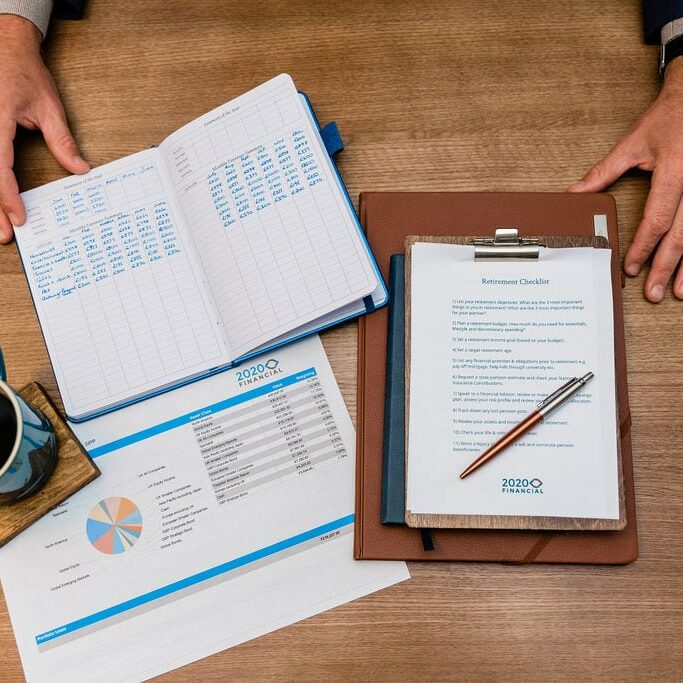If you’re looking for financial advice you might be confused about how much Financial Advisors charge. Maybe you’re comparing charges and struggling to find a baseline and now you’re left wondering ‘How much should I pay a financial adviser?’. Nobody wants to pay more than they should, but it’s hard to work out how much you should be paying.
How much does a financial advisor cost? It depends, Independent Financial Advisor fees vary. Average Financial Advisor charges are usually between 0.5-1% and you’ll need to factor the cost of your investments on top
Of course, that doesn’t really answer your question and to confuse the matter further, not all Financial Advisers charge in the same way, so you might struggle to compare the fees in a like-for-like way. In this article, we’ll try and unravel the confusion and talk you through Financial advice costs.
There’s no set fee for financial advisers, the market is open for them to charge whatever they like. There’s no right or wrong but there seem to be a lot of advisers charging high fees that aren’t particularly transparent. You should understand exactly how much you are paying and be comfortable that you are being offered good value for the service that’s being offered.
When you first engage a financial adviser, you’ll normally be paying for one of 2 things –
- The initial work – provide advice, do research, set up your investments,
- Ongoing management fees – manage your investments, rebalance your portfolio, reporting.
Financial Adviser’s don’t all charge the same way, so you might find it difficult to compare like for like. There are a number of ways you could be charged:
- Flat Fees
- Hourly Fees
- Percentage of the Investment
Flat fees are a one-off charge for the advice and implementation you receive. If you are commissioning a report or setting up something simple like an ISA you’ll probably pay a flat fee.
You might also pay a fee for the initial work and then a flat annual fee for reviews or for any additional work your adviser does.
Some advisers may charge by the hour for their work. You should be aware that with complex cases the research and time involved to conduct the work might be extensive. Make sure you are aware of how long the work is likely to take.
Most Financial Advisers will charge a percentage of your investment amount as an ongoing fee. Some investment work is highly specialist and you may be charged more for it.
The adviser is charging for their time, expertise and they are also charging for the risk that they are taking on as a business.
The costs of financial advice
Aside from the upfront charge and ongoing fees for financial advice that you might pay there are other investment costs involved that your financial adviser could influence. Depending on the advice they give, they could save or make you a considerable amount of money, or cost you far more than you need to pay.
You’ll typically pay around anywhere between 0.75%-1.25% per annum for ongoing financial advice (find our fee structurehere).
We have seen some Financial Advisors charging as little as 0.35% – 0.5% but often find that when this is the case, they are outsourcing their investment decisions to a Discretionary Fund Manager, adding another layer of costs, which could typically run to another 1%.
There are investment charges that you’ll have to pay whether you choose to self-invest or use a financial adviser, but be aware, if you’re using a tied adviser (e.g. St James Place, High Street Banks) you’ll only be offered their own investments, which can, in some cases, be significantly more expensive than the alternatives available.
Types of investment fees involved:
- Platform product cost
- Investment fund cost
- Additional costs
- Annual SIPP fees,
- Drawdown charges,
- Transactional costs to change investments
- Exit fees
Platform Provider Charges
In order to invest, you need a platform provider. They give you access to funds, will hold your investments for and in most cases provide you with digital access to see how your investments are performing. They all charge differently, so depending on who your Financial Adviser selects, you could pay more or less.
| Up to £250000 | 250k-1million | Over 1 million | |
|---|---|---|---|
| Hargreaves Lansdown | 0.45% | 0.25% | 0.1% |
| Fidelity * | 0.35% | 0.2% | |
| AJ Bell | 0.25% | 0.1% | 0.05% |
*If you have more than one investment account per household, it’s worth noting that Fidelity discounts their fees based on the household total investment, whereas the others will only view the value of the individual investments.
Platform provider investment charges. Correct as of January 2020. For illustrative purposes only. Please check with the platform provider for their latest charges.
Fund Charges
You may be charged more by one platform provider for the exact same fund. So depending on how much money you have to invest, it may be cheaper to choose one platform provider over another.
For instance:
| Hargreaves Lansdown | Fidelity | AJ Bell | |
|---|---|---|---|
| Lindsell Train Global Equity fund | 0.5%* | 0.65%* | 0.65%* |
For illustrative purposes only. Source: This is money, Oct 2019. Please check with Fund providers for their latest charges. *Additional annual charge applies
In October 2019 Vanguard slashed its fees on range of index and exchanged-traded (ETFs) funds, bringing the average ongoing charges figure (OCF) across its range down to 0.2%, but you need to balance the costs against your investment goals.
The fact is that you could be paying much more than the headline rate.
It’s important to note that cheapest doesn’t always mean best. Your Financial advisor will assess not just the Platform Provider Cost, but the TOTAL ongoing charges cost as well as the performance of the fund itself. If cheaper funds offer poor potential returns then they are a false economy. It’s not a simple comparison, and that’s part of the reason that you pay for a financial adviser’s market knowledge and expertise.
You need to look at the TOTAL charges you could end up paying.
Self-investing is not a guarantee of paying lower charges. We’ve seen several cases of individuals making poor platform and fund decisions that have ended up costing them far more than they would have paid to have their investments fully managed.
Beware of Old investments
You could be paying too much for basic passive investments by selecting higher-cost deals. Some older tracker funds launched in the 90s or early 2000s, generally sold through banks and insurance are charging much higher fees than newer tracker funds.
The Halifax UK FTSE 100 fund and Halifax UK FTSE All Share fund can charge as much as 1% despite the fund offering share classes at half the cost. Although these funds have not been marketed to new investors since 2010.
In 2017, Halifax created share classes charging 0.5pc and 0.51pc. Compare that to iShares and Vanguard, FTSE 100 and FTSE All Share tracker funds – that charge between 0.05pc and 0.07pc.
What is a reasonable amount to pay a financial advisor?
Considering the fact that a good Financial adviser could not only make you money but save you from making expensive mistakes, it’s worth paying for a good one. The industry average is around 1% for ongoing advice.
Shop around. Speak to a couple of advisors, ask them which platforms they typically use, how much they cost and what investment costs you could expect to pay under their advice. This should give you an idea of how much you’ll be paying.
What is the normal fee for a financial advisor?
There’s no such thing as a normal fee when it comes to financial advice. With some charging per hour, some charging one-off and some charging a percentage of the amount being invested.
You may also spend more depending on your location, the size of the firm and the service you’re being offered.
Again, the best advice is to shop around.
Is it worth paying for a financial advisor?
In our experience, it’s always worth paying a decent financial advisor for good financial advice. When it comes to something as important as your future, your family’s security and peace of mind you don’t want to leave it to chance.
Are financial advisers worth it?
Yes, The right financial adviser will be worth their weight in gold. It’s not just about investment returns, they are experts in the rules surrounding pensions and investments, the tax-efficiencies they can offer you alone more than cover their fees. Not to mention managing your risk, monitoring your investments and making they’re on track.
We’ve spoken to too many self-investors whose investment strategies are exposing them to dangerous levels of risk that they are completely unaware of. A financial advisor will build your portfolio for growth but in a way that offers you some buffer from market dips.
Unfortunately, over-confidence in self-investors is rife. Simon Garber, our pension specialist says “Many self-investors I speak to believe that they have created a portfolio that is lower risk than what they have actually created. Even after filling out a detailed risk questionnaire and having their portfolio analysed they will still believe that they know best.”
The Value of Financial Advice: Case Study
Ahmed, 55, was a self-investor who wanted to transfer his defined benefit pension worth £1.5 million so that he could release all of his 25% tax-free cash to clear down an unsecured debt of over £200,000 and use the remainder to travel and purchase a holiday home.
What Ahmed wasn’t aware of was the £150,000 tax-bill he would incur once he crystallised his pension and went over the lifetime tax allowance. The rate of tax you pay on pension savings above your lifetime allowance is set at 55% if you receive it as a lump sum.
- By keeping his withdrawals under the lifetime allowance threshold, he could defer the tax until his 75th birthday and pay 25% for pension payments or cash withdrawals

As a Pension Specialist for 14 years, our managing director Simon Garber has seen it all.
“My role as a financial adviser is not just about managing money. I’m the one keeping things objective – people can panic. They have biases and deep-rooted beliefs that can cause them to act irrationally around money. I’m here to make sure that doesn’t happen.
With self-investors I see a lot of weird and wonderful portfolios but almost always they are exposed to far more risk than they are comfortable with and they have no idea how much risk they’ve exposed themselves to. “
Left to their own devices most people will make classic investment mistakes and have a lack of diversity in their investment portfolio. A financial adviser will take a wider view and has a deeper knowledge of the way that different investments perform in different market conditions.
“I often have to be the voice of reason when people want to start taking money from their pension early for no apparent reason. They don’t need to take it but the money is burning a hole in their pocket and they have an irrational fear of losing everything. They think their money will be safer in cash, but cash is an absolute guarantee that your investment will go down in value every year.
Plus, their desperation to get their hands on their pension can create large tax bills that might have been completely avoided by doing things in a different way.”
Financial Advisers will help you balance your cash flow so that you have what you need now but you also allow your money to stay invested and grow.
What can a financial advisor do for me?
A financial adviser can help you manage your money, investments, retirement planning and pensions, as well as advise you on things like life insurance, critical illness insurance and estate planning.
They’re there to give you expert advice, inform you of any legislator changes that could impact your investments and be an objective voice of reason.
1) Manage your investments
After years of low-interest rates in the UK, traditionally low-risk investments like bank accounts, and bonds are no longer offering inflation-beating returns. In fact, with such low interest rates and steady inflation, most bank accounts virtually guarantee that the value of your money will go down over time.
So you’ll need to invest your money elsewhere to maintain or grow the value of your investment. This will raise even more questions…
- Do you invest in stocks and shares?
- Do you choose a tracker fund or managed fund?
- Should you invest in Gold? Bonds? Property?
- How will you allocate your portfolio?
- How will you assess risk & manage volatility?
- How often will you review?
- Where will you do your research? Is your source reliable/unbiased?
- How will you stay up to date on tax, legislation changes, legal, economic issues etc…
This is where a Financial Adviser can help. Financial advisers offer advice on the most suitable investment products based on your needs.
2) Manage your risk
Risk is something that all investors must contend with since Investments can (and do) go down as well as up. Generally the more risk you are willing to take, the higher the potential returns you could receive. On the flip side, high risk means higher potential losses too.
A financial adviser will help you decide how much risk you should be taking, based on your goals and financial situation and how comfortable you are with risk. They’ll then make sure that your investments are in line with that amount of risk. Most self-investors tend to unwittingly expose themselves to higher risk than they are comfortable with.
3) Keep you up to date with changes to pension & investment legislation
Pension and investments rules change as do tax rules surrounding them. Your financial adviser will help you to avoid expensive and avoidable mistakes.
Here are just some of the areas of pension and investment legislation they can help you with.
- Money Purchase Annual Allowance
- Pension saving limits
- ISA allowance
- Dividend allowance & capital gains
- Tax-efficient saving options
- Pension Lifetime Allowance
4) Offer alternative courses of action
Financial Advisers can also take a holistic view of your finances and suggest alternative actions that would see you reach your goals. Think of them as a life coach for your money. Sometimes the most obvious course of action isn’t always the best or most effective.
Not all debt is bad, a financial adviser can help you decide if a loan or a mortgage might be more cost-effective than an alternative course of action.
You may be able to move your money around in a way that helps you meet your goals without incurring extra costs or added taxes.
Financial advisor fees case study
Steve was a prime example of irrational thoughts driving financial decisions.
Despite being in very good health with no family history of early death Steve had convinced himself that everyone is dying young and that he needs to “live life while he can”.
He was still working but desperately wanted to get hold of his 25% tax-free cash at 55 to spend on holidays. However, when we dug deeper it turns out that he can fund his trips out of income, and has no need for the income until 2022 at the absolute earliest.
He eventually agreed that as he doesn’t actually need the money now, it would be better to leave it invested as he always has the option to access it at a later date as and when he does need it.
Now he has more money invested to grow and he still has his tax-free cash that he can access when he actually needs it.
Ok, so how much should I pay a financial advisor then?
How much you pay should be proportional to the amount of money you have, the amount of money you’re earning on your investments over time (remember your investments can go down as well as up) and the complexity of the work they are undertaking.
What are the duties of a financial advisor?
In the UK, Financial advisors are regulated and must be authorised by the Financial Conduct Authority. As such they are required to comply with a strict code of practice that covers their duties as a financial adviser, which includes acting with integrity, due diligence and treating customers fairly.
Advisors have a duty to be open and transparent about how they work and what they charge their customers.
FCA code of practice
- Rule 1: You must act with integrity.
- Rule 2: You must act with due skill, care and diligence.
- Rule 3: You must be open and cooperative with the FCA, the PRA and other regulators.
- Rule 4: You must pay due regard to the interests of customers and treat them fairly.
- Rule 5: You must observe proper standards of market conduct.
In addition to these duties, if your Advisor is a member of a professional body such as the Personal Finance Society, they will also be required to comply with the code of conduct set out by the professional body.
PFS and Chartered Institute of Insurers Require their members to:
- Comply with their Code of ethics and all relevant laws and regulations
- Act with the highest ethical standards and integrity
- Act in the best interests of each client
- Provide a high standard of service
- Treat people fairly regardless of age, disability, gender reassignment, marriage/civil partnership, pregnancy/maternity, race, religion or belief, sex and sexual orientation
How much should you be paying?
It depends on how much money you have and the complexity of your investments, what you should be concerned with is the cost versus the potential returns of your portfolio
You need to balance how much you’re paying with the potential returns
Simon Garber, says it can be worth paying higher fees if you’re getting the returns and the service you want but “If you’re paying more than 2.5-3% in total, you need to be asking questions about whether the returns are worth it.”
How to find a financial advisor you can trust
Finding a financial adviser is not just about finding someone you can trust, it’s also about finding someone that you are happy to work with long term. It’s important to find both.
Here’s our advice on how to pick the right financial advisor:
How to pick the right financial advisor
- Check they are FCA regulated – check they are on the FCA register and that they are qualified to give advice in the area you need. Do not work with anyone who is unregulated or dealing in unregulated investments.
- Check their online reviews – look at their reviews on independent sites such as Google, Facebook, LinkedIn etc. Remember that testimonials written out on a website can be faked, it’s easier to see if there’s a real person behind the review online (have they left other reviews, do they have an active profile?)
- Ask friends/colleagues for recommendations of advisers that they have worked with and that they trust. Ideally, people, they have a long term relationship with.
- Speak to several and ask for referrals from their clients
- Check their website / Social media – do they look reputable, professional, is it up to date?
- Meet them – either meet them face-to-face or have a skype call and see if you get on with them
- Ask them about their fee structure and get a quote before you agree to anything.
- If you’re dealing with a Pension Transfer ask if they have Pension Gold Standard. This holds them to a higher professional standard than other firms.
- Ideally, you want to be dealing with the owner or a shareholder of the business for continuity. It makes sense to build your trust with someone that is going to be staying around – and who also has a vested interest in your money.
Want to talk to a Financial Advisor?
We offer a free, no-obligation, introductory call. Why not get in touch today and find out how we can help. Feel free to get in touch if you’re looking for a second opinion on whether you’re being quoted too much for financial advice.



